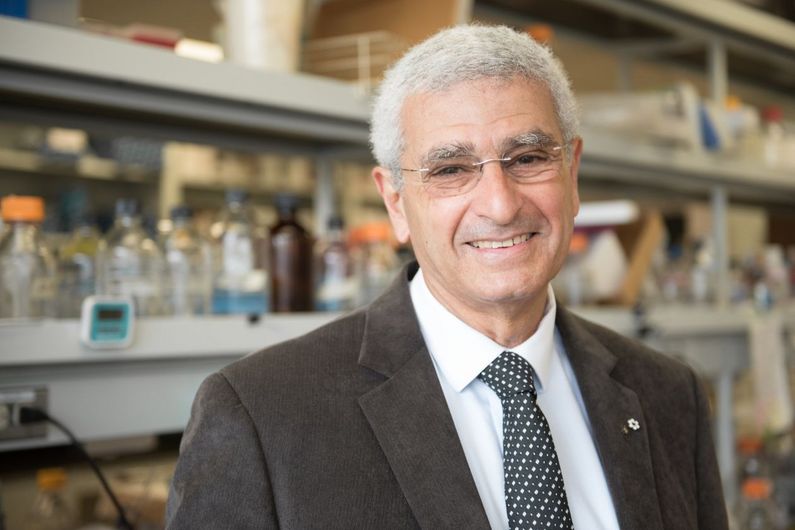Making an impact on the lives of cardiovascular patients
- UdeMNouvelles
12/21/2023
The work of UdeM medical professor and IRCM researcher Nabil G. Seidah is at the heart of one of the world's 11 pivotal clinical trials in medicine of 2024.
Eleven clinical trials will shape the immediate future of medicine in 2024, according to the scientific journal Nature Medicine – and a key figure behind one of them is Université de Montreal medical professor and Montreal Clinical Research Institute researcher Nabil G. Seidah.
To identify the clinical trials with the greatest therapeutic potential, the journal asked leading international researchers to name those they think will be most likely to result in concrete advances in medicine in 2014, with answers ranging from a vaccine against HIV to artificial-intelligence tools for patient triage.
A trial stemming from Seidah's discovery of the role of the proprotein convertase PCSK9 in cardiovascular disease was cited by the first of those experts, Amit Khera, a cardiologist at Brigham and Women's Hospital, lecturer at Harvard Medical School and vice-president of genomic medicine at Verve Therapeutics.
‘’If ever there was a need to demonstrate the importance of the impact of Nabil Seidah's work on the whole field of modern medicine, and its positive impact on human health, this citation is further proof," said IRCM president and scientific director Jean-François Côté.
1 in every 300 people
Around one in every 300 people is born with heterozygous familial hypercholesterolemia, one of the most common inherited genetic conditions. The disease is caused by mutations in the three genes LDLR, APOB or PCSK9.
PKSK9 encodes a protein that breaks down receptors for low-density lipoprotein (LDL), a type of cholesterol found in the blood. Statins can reduce the risk of cardiovascular disease in these patients, but most under chronic treatment fail to achieve optimal LDL cholesterol levels.
Verve Therapeutic is conducting a global, phase-1b clinical trial called heart-1 that is the world's first human study of in vivo DNA base editing, and has the potential to demonstrate proof-of-concept for base-editing therapeutic approaches targeting Seidha's discovery, PCSK9, to sustainably lower LDL cholesterol.
Known worldwide
Seidah is known worldwide as the scientist responsible for the discovery and cloning of seven of the nine known secretory serine proteases belonging to the proprotein convertases.
Proprotein convertases are essential for the regulation of the neural and endocrine systems, and for the proper functioning of many peripheral organs, including the liver, pancreas, pituitary gland and heart, as well as the cardiometabolic and immune systems.
Proprotein convertases have been identified as therapeutic targets for viral infections, inflammation, hypercholesterolemia and cancer. Seidah's work, which has already been the source of groundbreaking cholesterol drugs, therefore holds great potential for the future development of innovative therapies.
A most-cited scientist
With more than 820 peer-reviewed manuscripts, Dr. Seidah is the most recognized protease expert in Canada, and sixth worldwide. He was cited this month in Clarivate Analytics' Web of Science ranking of the world's most cited scientists. As genetics and biopharmaceuticals continue to develop as research fields, his discoveries promise to translate into improved therapies and personalized preventive treatments for patients with age-related diseases.
In a career spanning almost 50 years, the Egyptian-born scientist has received numerous awards and distinctions. He has been a member of the Ordre du Québec since 1997 and of the Order of Canada since 1999. He has held a Tier 1 Chair in Precursor Proteolysis since 2003, and is the recipient of the 2018 Lefoulon DeLalande (Institut de France) and Akira Endo awards, for his research and innovations in cardiovascular disease, as well as the 2021 Kuwait Prize for Applied Medical Sciences and, in 2023, the J. Allyn Taylor Award for his studies leading to revolutionary biotherapies in cardiovascular disease.
Seidah directs the biochemical neuroendocrinology research unit at the IRCM's Centre de santé cardiométabolique, and is a full professor in UdeM's Faculty of Medicine.
Media contact
-
Florence Meney
IRCM
Tel: 514-987-5500, poste 5535 -
Jeff Heinrich
Université de Montréal
Tel: 514 343-7593












